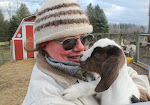Our next stop was at the Cowgirl Creamery where owners Sue Conley & Peggy Smith treated our group to a tasting of their cheeses and spoke about their dedication to providing a showcase for artisan cheesemakers.
 After a short walk over a few blocks, we arrived at the Penn Quarter Farmers Market, one of the FreshFarm Markets. Market co-director Bernie Prince introduced us to the cheesemakers selling at the market and spoke about the demographic who regularly shops there.
After a short walk over a few blocks, we arrived at the Penn Quarter Farmers Market, one of the FreshFarm Markets. Market co-director Bernie Prince introduced us to the cheesemakers selling at the market and spoke about the demographic who regularly shops there. Then we were off to the Big Bear Cafe where we were welcomed by Robin Shuster who has started a number of smaller farmers markets in several D.C. neighborhoods.
Then we were off to the Big Bear Cafe where we were welcomed by Robin Shuster who has started a number of smaller farmers markets in several D.C. neighborhoods.  Our final stop of the day (after our driver was lost in D.C. for nearly 45 minutes) was the Whole Foods store in Georgetown. What a cheese counter!
Our final stop of the day (after our driver was lost in D.C. for nearly 45 minutes) was the Whole Foods store in Georgetown. What a cheese counter! Overall, the Pennsylvania Farmstead & Artisan Cheese Alliance was well-received and from this trip I'm sure more Pennsylvania cheeses will be showing up in D.C restaurants, specialty shops, cheese counters and farmers markets.
Overall, the Pennsylvania Farmstead & Artisan Cheese Alliance was well-received and from this trip I'm sure more Pennsylvania cheeses will be showing up in D.C restaurants, specialty shops, cheese counters and farmers markets.














